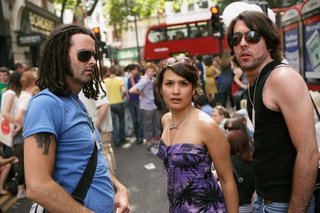This should actually be called “world building when you don’t have a clue” although I’m not talking about general world creation [a la god], but something perhaps of more of value to all writers – what do you do when you want to include something in your novel that you don’t know too much about?
I was prompted to think about this because someone asked me about ships. He saw that I had written The Isles of Glory and wanted to know where I got the info on sailing ships that I put into the 3 books.
I’m not a sailor. I used to paddle a homemade canoe on the Canning River as a kid. I loved all the Swallows and Amazon books and read every one multiple times – which did teach me words like “sheet” and “tack” and “cleat” and all that nautical stuff. Not enough to make me able to write a book that included trips on 18th or 19th century sailing ships!
[Word of caution, though: learning facts from fiction books can be hazardous…who’s to say that the writer knew what he or she was talking about?]
I once took a day trip sailing on a schooner to a couple of islands, and once spent a few days sailing with friends from Phuket to Ko Surin and Ko Semilan, none of which qualifies me as a sailor either.
So…how did I do it.
Well. firstly I made darn sure [I think] that I didn’t make mistakes. If I mentioned a particular type of ship [schooner, brigantine etc], I made sure my description of the ship had the right number of masts, steering system, and so on. Not good to put a tiller into a ship that steers by means of a wheel! All this can be checked from internet sites. The moment you make a mistake, you lose your knowledgable reader. And unfortunately it will be what he remembers most about your book.
[Caution 2 : anything taken from the internet is not necessarily correct. Double and triple check everything.]
Secondly, I don’t try to be too smart and include a whole bunch of stuff I don’t know too much about. Rather I take the small details and make them true and visual – those are the things that give the atmosphere, the feel of being there. And it helps if you remember interesting bits and pieces from your own experience. For example, we have a chest-of-drawers in my family that came out from England with my ancestors. When you have a 6 month journey ahead of you, living out of a chest, what sort of a chest do you want? One that opens with a lid? Nope. You can’t put things on top of it then. One that actually has drawers is much better – with nice inset brass handles that you won’t bruise yourself on when the ship heaves…
Here are some examples from the three books of the Isles of Glory – from large to small vessels and with different first person narrators…
The ship came in under sail and bumped against the dock as gently as a rowboat on a jetty. A typical piece of Keeper seamanship; there was very little the Keepers did badly. Just a look at the vessel was enough to know that they were special: the woodwork gleamed, the sails were unpatched, the ropes were neatly coiled, the brass shone, there were rat-barriers on the hawsers. A greater contrast to the shabby, foetid slaver tied up beside them couldn’t have been imagined.
_______________________
We had drifted further out to sea and were in among the fisher fleet. Their lanterns gleamed only dimly now as the sky lightened. The golden paths across the water had gone. I could hear the sound of voices and laughter coming to us from the fishermen as they hauled up lines, pulled in nets. I lay back, to look up at the mast just visible in the pre-dawn light. A bird was sitting on the crosstree, a creature too small to be one of the usual seabirds. I eyed it uneasily; it looked like that pet of Flame’s. I wondered how long it had been perched there. It cocked its head to one side and I suddenly felt very naked. I pulled the blanket up over my body. ‘Scram,’ I said. ‘Go tell her I’m all right.’
_______________________________
It was a close call, but we made it, slipping out on the tide with just minutes to spare. We would never have managed it if the whole of Rattespie had not taken it as a challenge. This was the first local ship to set sail for weeks; it meant money in the townsfolk’s coffers and they weren’t about to waste the opportunity. Chandlers bustled, farmers appeared out of nowhere with fresh produce, sailors signed up, longshoremen came looking for work loading the ship, shipwrights recaulked part of the deck where timbers had dried out and shrunk.
_________________________________
As I pen this in my cabin aboard the R.V. Seadrift, I find myself wondering: is this really I, Anyara isi Teron, here on board a ship bound for the Isles of Glory? Freckled, prosaic, undistinguished Anyara, embarking on an adventure most men could only dream about – it’s not possible, surely! And yet I, an unmarried woman, find myself untrammelled by family, with the shores of Kells rapidly dwindling on the horizon and empty ocean ahead…adventure indeed.
From where I sit, if I glance over to the wall under the porthole, I see my two sea chests, now stacked on top of each other to make a chest-of-drawers with polished brass handles; all I have to do is open that top drawer and the documents are there for the reading. And yet I hesitate to hurry through the papers. I have months ahead of me, and I must ration my reading. Perhaps this evening I will dip into the first of the papers. Just a few.
______________________
A few words, that’s all it takes to convey the size of a ship, or a cabin; the uncertainty of sailing into the unknown; the work involved in getting a ship ready for a long sea voyage. A writer doesn’t need to know everything to say enough.







